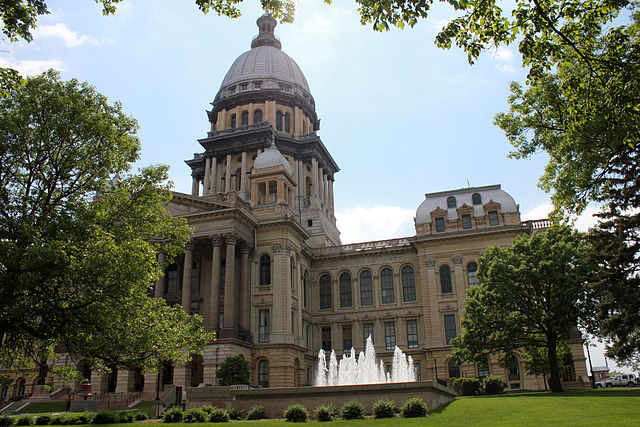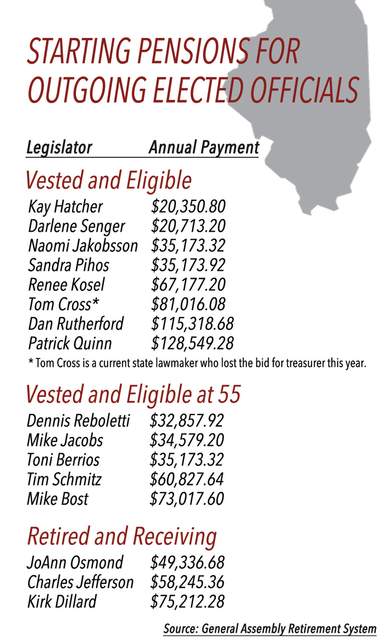Last month, former Illinois governor Jim Edgar gave his thoughts on the state’s pension situation. He notably said he didn’t support the state’s pension reform law, and said the following:
“I don’t think also you have to have 100 percent funding in the pension plan. Everybody’s not going to retire at the same time. I think you can keep probably 75, 80 percent is sufficient, but I think what you’ve got to demonstrate to a lot of folks out there who rate the state’s credit and a lot of those things is that the plan will work over a period of time and that they are committed and are going to stick with it.”
Actuary Mary Pat Campbell, who runs the STUMP blog, weighed in on Edgar’s comments. As you’ll see, she is not a fan of Edgar’s pension knowledge. The full post is below.
_________________________________
By Mary Pat Campbell, originally published on STUMP
Seems that not all recent Illinois governors end up in prison, (Quinn isn’t out of the woods yet!) but perhaps they should be jailed for this crap:
“I don’t think also you have to have 100 percent funding in the pension plan. Everybody’s not going to retire at the same time. I think you can keep probably 75, 80 percent is sufficient, but I think what you’ve got to demonstrate to a lot of folks out there who rate the state’s credit and a lot of those things is that the plan will work over a period of time and that they are committed and are going to stick with it. We thought when we put in the provision you had to pay into the pension plan first thing before you did anything else that they would keep paying in. I never thought they would have the nerve to change that, but under (former Gov. Rod) Blagojevich they did and so you’re going to have to find some safeguards to put into the plan, but I think it’s going to take 20, 30 years to get to the level we want to get to, but if we start working toward it and don’t go on any spending spree with the pension plan, I think we can do that.”
First off, we do have an appearance of the 80% canard, but there’s a new lie that’s been creeping in that is pissing me off: “Oh, it’s not a problem right now… it would only be a problem if everybody retired at the same time.”
Let me explain, conceptually, what the pension liability is supposed to represent, and what the unfunded portion represents: it is what people have earned for their PAST service, and is using all sorts of assumptions, such as THE AGE THEY WILL PROBABLY RETIRE.
The actuarial value of the pension, under even the craziest approaches, does not assume everybody retires right now.
Let’s consider your pension value for a person still working: each extra year of service, they’ve earned some more. They are also a year closer to retirement. As long as they keep working and are still alive, the value of their pension increases, under most pension benefit design. Sometimes you’ll see a pension value drop at later ages, but that’s getting persnickety (though it has had some repercussions elsewhere).
The pension valuation is supposed to be a snapshot, indicating what has ALREADY BEEN EARNED. There are approaches that try to capture future salary increases, and tries to make accrual less drastic (as one usually does see huge increases in pension value right before retirement under some approaches).
The main time the pension value would be decreasing for a person is when they’re in retirement, as they’re not accruing more benefits, and each year they’re one year closer to death. The time the pension gets paid out is generally getting shorter. If the pension fund cannot cover retiree benefits, it’s in a really bad condition.
And here’s the deal: some pensions are not able to cover just the current retiree portion of the benefits:
Nobody is any more worried now than they were before the New Jersey Pension Study Commission report came out. Yes, “[t]his problem is dire and will only become much worse if meaningful steps are not taken quickly” but what does that really mean to anyone?
…. Scary Conclusions
1. For retirees there may be about $15 billion to cover $40 billion in liabilities and that’s ONLY for retirees leaving absolutely NOTHING for the 151,669 participants who have not yet started receiving monthly benefits except, for now, the refund of their contributions.
2. There is an equally good chance that Conclusion #1 is overly optimistic
I doubt New Jersey is the only state in that situation. As noted earlier, Kentucky is looking really bad.
And in my recent teaser, I showed a set of graphs I am developing for various pension plans. The ones being shown were for Texas Teachers Retirement System. I will explain them in a later post, and start showing you some truly scary information — using the official numbers from the plans themselves.
But shame on Gov. Edgar for mouthing the same bullshit everybody else does in favor of underfunding the pensions. I have looked at over a decades’ worth of Illinois pension valuations, and for all major funds (except one), they deliberately underfunded by substantial amounts, even in “good” years.
If you’re not going to make contributions when times are good, guess what will happen to the pensions when times are bad?
I guess ex-Gov. Edgar wants to cover his own ass for the pensions being underfunded in the go-go 90s, when he was governor (1991 – 1999). Hey! Everybody was doing it! 80% is good enough!
NO, IT’S NOT.
SHAME.




